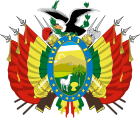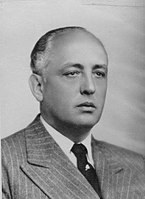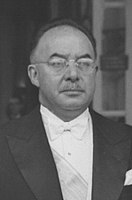| Peñaranda cabinet | |
|---|---|
102nd–107th Cabinet of the Republic of Bolivia | |
| 1940–1943 | |
 | |
| Date formed | 15 April 1940 (1940-04-15) |
| Date dissolved | 20 December 1943 (1943-12-20) |
| People and organisations | |
| President | Enrique Peñaranda |
| No. of ministers | 9 (on 20 December 1943) |
| Total no. of members | 34 (including former members) |
| Member parties | Liberal Party (PL) Socialist Republican Party (PRS) Genuine Republican Party (PRG) United Socialist Party (PSU) (from 16 September 1943) |
| Status in legislature | Majority government (1940–1943) National unity government (1943) |
| History | |
| Election | 1940 general election |
| Legislature terms | 1940–1942 1942–1944 |
| Predecessor | Cabinet of Carlos Quintanilla (interim) |
| Successor | Cabinet of Gualberto Villarroel |
| Politics of Bolivia |
|---|
 |
| Constitution |
| Executive |
| Legislative |
| Judiciary |
Elections
|
| Administrative divisions |
|
Foreign relations
|
|
|



Enrique Peñaranda assumed office as the 38th President of Bolivia on 15 April 1940, and his term was terminated by a coup d'état on 20 December 1943. A general in the Chaco War, Peñaranda was brought forth by the traditional conservative political parties, sidelined since the end of the Chaco War, as their candidate in the 1940 general elections.
Peñaranda formed six cabinets during his under 44-month presidency, constituting the 102nd to 107th national cabinets of Bolivia.
Cabinet ministers
Cabinet of Bolivia Presidency of Enrique Peñaranda, 1940–1943 | |||||||||
|---|---|---|---|---|---|---|---|---|---|
| Office | Name | Party | Prof. | Term | Days | N.C | P.C | ||
| President | Enrique Peñaranda | CONC | Mil. | 15 April 1940 – 20 December 1943 | 1344 | – | – | ||
| Minister of Foreign Affairs and Worship (Chancellor) |
Alberto Ostria Gutiérrez | – | Law. | 26 August 1939 – 1 October 1941 | 767 | 101 | 1 | ||
| 103 | 2 | ||||||||
| 104 | 3 | ||||||||
| Eduardo Anze Matienzo | – | Law. | 1 October 1941 – 26 November 1942 | 421 | 105 | 4 | |||
| Tomás Manuel Elío | PL | Law. | 26 November 1942 – 16 September 1943 | 294 | 106 | 5 | |||
| Carlos Salinas Aramayo | PSU | Law. | 16 September 1943 – 20 December 1943 | 95 | 107 | 6 | |||
| Minister of Government and Justice |
Minister of Propaganda |
Julio de la Vega | Military | Mil. | 15 April 1940 – 11 November 1940 | 210 | 102 | 1 | |
| Minister of Immigration |
Demetrio Ramos | Military | Mil. | 11 November 1940 – 12 June 1941 | 213 | 103 | 2 | ||
| Zacarías Murillo | Military | Mil. | 12 June 1941 – 1 October 1941 | 111 | 104 | 3 | |||
| Adolfo Vilar Mendivil | PL | Law. | 1 October 1941 – 20 July 1942 | 292 | 105 | 4 | |||
| Bernardo Navajas Trigo | PL | Law. | 20 July 1942 – 26 November 1942 | 129 | |||||
| Pedro Zilveti | PRS | Law. | 26 November 1942 – 20 December 1943 | 389 | 106 | 5 | |||
| 107 | 6 | ||||||||
| Minister of National Defense |
– | Demetrio Ramos | Military | Mil. | 15 April 1940 – 11 November 1940 | 210 | 102 | 1 | |
| Minister of Colonization |
Carlos Blanco Galindo | Military | Mil. | 11 November 1940 – 12 June 1941 | 213 | 103 | 2 | ||
| Jose Miguel Candia | Military | Mil. | 12 June 1941 – 20 December 1943 | 921 | 104 | 3 | |||
| 105 | 4 | ||||||||
| 106 | 5 | ||||||||
| 107 | 6 | ||||||||
| Minister of Finance and Statistics |
Edmundo Vásquez | PRS | Law. | 15 April 1940 – 11 November 1940 | 210 | 102 | 1 | ||
| Joaquín Espada | PRG | Law. | 11 November 1940 – 16 September 1943 | 1039 | 103 | 2 | |||
| 104 | 3 | ||||||||
| 105 | 4 | ||||||||
| 106 | 5 | ||||||||
| Luis Calvo | PRG | – | 16 September 1943 – 20 December 1943 | 95 | 107 | 6 | |||
| Minister of Economy | Office blank 15 April 1940 – 12 June 1941 | ||||||||
| Víctor Paz Estenssoro | PSI | Law. | 12 June 1941 – 17 June 1941 | 5 | 104 | 3 | |||
| Office vacant 17 June 1941 – 23 July 1941 | |||||||||
| Alberto Crespo Gutiérrez | – | – | 23 July 1941 – 16 September 1943 | 785 | |||||
| 105 | 4 | ||||||||
| 106 | 5 | ||||||||
| Germán Chávez | PL | – | 16 September 1943 – 20 December 1943 | 95 | 107 | 6 | |||
| Minister of Industry and Commerce |
Hugo Ernst Rivera | PSU | Dip. | 15 April 1940 – 11 November 1940 | 210 | 102 | 1 | ||
| Office discontinued from 11 November 1940 | |||||||||
| Minister of Public Works and Communications |
Justo Rodas Eguino | PRS | Law. | 15 April 1940 – 11 November 1940 | 210 | 102 | 1 | ||
| Oscar Mariaca Pando | PL | Mil. | 11 November 1940 – 9 May 1941 | 179 | 103 | 2 | |||
| Adolfo Vilar Mendivil | PL | Law. | 9 May 1941 – 12 June 1941 | 34 | |||||
| Justo Rodas Eguino | PRS | Law. | 12 June 1941 – 26 November 1942 | 532 | 104 | 3 | |||
| 105 | 4 | ||||||||
| Julio Sanjinés | Military | Mil. | 26 November 1942 – 16 September 1943 | 294 | 106 | 5 | |||
| José Salmón Ballivián | – | – | 16 September 1943 – 20 December 1943 | 95 | 107 | 6 | |||
| Minister of Mining and Petrol |
Alfredo Jordán | PL | Law. | 15 April 1940 – 11 November 1940 | 210 | 102 | 1 | ||
| Edmundo Vásquez | PRS | Law. | 11 November 1940 – 12 June 1941 | 213 | 103 | 2 | |||
| Office discontinued from 12 June 1941 | |||||||||
| Minister of Work and Social Security |
– | Bernardo Navajas Trigo | PL | Law. | 15 April 1940 – 11 November 1940 | 210 | 102 | 1 | |
| Minister of Health | Abelardo Ibáñez Benavente | – | Dr. | 11 November 1940 – 26 November 1942 | 745 | 103 | 2 | ||
| 104 | 3 | ||||||||
| 105 | 4 | ||||||||
| Juan Manuel Balcázar | PRS | Dr. | 26 November 1942 – 16 September 1943 | 294 | 106 | 5 | |||
| Enrique Hertzog | PRG | Dr. | 16 September 1943 – 20 December 1943 | 95 | 107 | 6 | |||
| Minister of Health and Hygiene |
Abelardo Ibáñez Benavente | – | Dr. | 15 April 1940 – 11 November 1940 | 210 | 102 | 1 | ||
| Office under the Ministry of Work and Social Security from 11 November 1942 | |||||||||
| Minister of Education, Fine Arts, and Indigenous Affairs |
Gustavo Adolfo Otero | – | Wri. | 15 April 1940 – 12 June 1941 | 423 | 102 | 1 | ||
| 103 | 2 | ||||||||
| Adolfo Vilar Mendivil | PL | Law. | 12 June 1941 – 1 October 1941 | 111 | 104 | 3 | |||
| Arturo Pinto Escalier | PRG | Dr. | 1 October 1941 – 26 November 1942 | 292 | 105 | 4 | |||
| Rubén Terrazas | PRG | Law. | 26 November 1942 – 16 September 1943 | 294 | 106 | 5 | |||
| Francisco Lazcano Soruco | PSU | – | 16 September 1943 – 20 December 1943 | 95 | 107 | 6 | |||
| Minister of Agriculture | Minister of Irrigation, Immigration, and Colonization |
Alcides Arguedas | PL | Wri. | 15 April 1940 – 11 November 1940 | 210 | 102 | 1 | |
| Minister of Irrigation, Mining, and Petrol |
Edmundo Vásquez | PRS | Law. | 11 November 1940 – 12 June 1941 | 213 | 103 | 2 | ||
| – | Office vacant 12 June 1941 – 26 November 1942 | 104 | 3 | ||||||
| 105 | 4 | ||||||||
| Minister of Livestock | Arturo Galindo | PL | Law. | 26 November 1942 – 16 September 1943 | 294 | 106 | 5 | ||
| Minister of Livestock and Colonization |
Julio Céspedes Añez | PRS | – | 16 September 1943 – 20 December 1943 | 95 | 107 | 6 | ||
Composition
First cabinet
Peñaranda's first cabinet was formed upon taking office on 15 April 1940 and was the 102nd national cabinet of Bolivia. Foreign Minister Alberto Ostria Gutiérrez was the only holdover from the interim Carlos Quintanilla government. Military figures Julio de la Vega and Demetrio Ramos were made Minister of Government, Justice, and Propaganda and Minister of National Defense respectively. Alcides Arguedas, a Liberal Party writer, journalist, and critic of the previous leftist governments, was made Minister of Agriculture, Irrigation, Colonization, and Immigration. Another noted writer, Gustavo Adolfo Otero was made Minister of Education, Fine Arts, and Indigenous Affairs. The Office of Fine Arts under the Ministry of Education and the Office of Irrigation under the Ministry of Agriculture were both newly established as part of this cabinet.
Second cabinet
Peñaranda's second cabinet was formed on 11 November 1940 and was the 103rd national cabinet of Bolivia. With the resignation of Arguedas, the offices he held were redistributed to different ministers. In this and future cabinets, the Office of Immigration would be held by the Ministry of Government and the Office of Colonization by the Ministry of Defense. The Ministry of Mining and Petrol was assigned to the new Minister of Agriculture and Irrigation, Edmundo Vásquez. The Ministries of Propaganda and Industry and Commerce were discontinued. As was the Ministry of Hygiene, with the Ministry of Health falling under the purview of the Ministry of Work and Social Security. Health Minister Abelardo Ibáñez Benavente also became Minister of Work.
Third and fourth cabinets
Peñaranda's third cabinet was formed on 12 June 1941 and was the 104th national cabinet of Bolivia. This cabinet saw the establishment of the Ministry of Economy separate from the Ministry of Finance and Statistics. Future President Víctor Paz Estenssoro was its first minister, though he only held the office for five days.
Peñaranda's third cabinet was formed on 1 October 1941 and was the 105th national cabinet of Bolivia. The Ministry of Agriculture remained vacant in both the third and fourth cabinets.
Fifth and sixth cabinets
Peñaranda's fifth cabinet was formed on 26 November 1942 and was the 106th national cabinet of Bolivia. The Ministry of Agriculture was filled once again with the addition of the new Ministry of Livestock, though with the Ministry of Mining and Petrol being discontinued.
Peñaranda's sixth and final cabinet was formed on 16 September 1943 and was the 107th national cabinet of Bolivia. Faced with opposition from the left-wing in Congress, Peñaranda attempted to form a national unity government for his seventh cabinet. Representatives from the United Socialist Party (PSU) were invited to join the administration. These were Carlos Salinas Aramayo (Foreign Minister), the then-leader of the PSU, and Francisco Lazcano Soruco (Education).
In December of the same year, Enrique Peñaranda would be deposed by liberal forces of the Revolutionary Nationalist Movement (MNR) and left-wing young officers led by Gualberto Villarroel.
Established Ministries
- Office of Fine Arts (under Education): Gustavo Adolfo Otero, first holder from 15 April 1940
- Office of Irrigation (under Agriculture): Alcides Arguedas (PL), first holder from 15 April 1940
- Ministry of Economy: Víctor Paz Estenssoro (PSI), first holder from 12 June 1941
- Office of Livestock (under Agriculture): Arturo Galindo (PL), first holder from 26 November 1942
Analysis
The six cabinets of Enrique Peñaranda reflected a brief return to the traditional political order Bolivia had seen prior to the Chaco War. The majority of ministerial positions were filled by members of the Genuine Republican (PRG), Socialist Republican (PRS), and Liberal (LP), parties which had been sidelined by the Military Socialist administrations of David Toro and Germán Busch. Three Bolivian presidents served in the Peñaranda administration. Minister of Defense Carlos Blanco Galindo had served as Interim President from 1930 to 1931. Finance Minister Víctor Paz Estenssoro and Health and Labor Minister Enrique Hertzog would both be elected president in the late 1940s and early 1950s.
Gallery
-
 Alberto Ostria Gutiérrez –
Alberto Ostria Gutiérrez –
Minister of Foreign Affairs -
 Eduardo Anze Matienzo –
Eduardo Anze Matienzo –
Minister of Foreign Affairs -
 Tomás Manuel Elío –
Tomás Manuel Elío –
Minister of Foreign Affairs (PL) -
 Carlos Salinas Aramayo –
Carlos Salinas Aramayo –
Minister of Foreign Affairs (PSU) -
 Demetrio Ramos –
Demetrio Ramos –
Minister of Government and Minister of National Defense -
 Adolfo Vilar Mendivil –
Adolfo Vilar Mendivil –
Minister of Government, Minister of Public Works, and Minister of Education (PL) -
 Pedro Zilveti –
Pedro Zilveti –
Minister of Government (PRS) -
 Bernardo Navajas Trigo –
Bernardo Navajas Trigo –
Minister of Government (PL) -
 Carlos Blanco Galindo –
Carlos Blanco Galindo –
Minister of National Defense -
 Luis Calvo –
Luis Calvo –
Minister of Finance (PRG) -
 Víctor Paz Estenssoro –
Víctor Paz Estenssoro –
Minister of Economy (PSI) -
 Justo Rodas Eguino –
Justo Rodas Eguino –
Minister of Public Works (PRS) -
 Juan Manuel Balcázar –
Juan Manuel Balcázar –
Minister of Work and Health (PRS) -
 Enrique Hertzog –
Enrique Hertzog –
Minister of Work and Health (PRG) -
 Gustavo Adolfo Otero –
Gustavo Adolfo Otero –
Minister of Education -
 Rubén Terrazas –
Rubén Terrazas –
Minister of Education (PRG) -
 Arturo Pinto –
Arturo Pinto –
Minister of Education (PRG) -
 Alcides Arguedas –
Alcides Arguedas –
Minister of Agriculture (PL)
Notes
- Denoting which national cabinet the minister was originally a part of.
- Denoting which presidential cabinet the minister was originally a part of.
- Originally a member of the 101st national cabinet of Bolivia.
- Originally a member of the Quintanilla ministerial cabinet.
- Acting Foreign Minister in the absence of Tomás Manuel Elío from 30 April to 1 July 1943.
- Acting Foreign Minister in the absence of Eduardo Anze Matienzo from 4 January to 5 February 1942.
- Acting Foreign Minister in the absence of Alberto Ostria Gutiérrez from 20 January to 3 February 1941.
- Acting Foreign Minister in the absence of Eduardo Anze Matienzo from 5 to 11 February 1942.
- Acting/Interim?
References
- Gisbert 2003, pp. 344–346
- "canciller". 7 April 2014. Archived from the original on 7 April 2014. Retrieved 24 January 2021.
- "canciller". archive.vn. 19 February 2013. Archived from the original on 19 February 2013. Retrieved 17 February 2021.
- "canciller". archive.vn. 19 February 2013. Archived from the original on 19 February 2013. Retrieved 17 February 2021.
- ^ "canciller". archive.vn. 19 February 2013. Archived from the original on 19 February 2013. Retrieved 17 February 2021.
- "DECRETO 20-07-1942 del 20 de Julio de 1942 – 4 » Derechoteca.com". www.derechoteca.com. Retrieved 24 January 2021.
- "canciller". archive.vn. 19 February 2013. Archived from the original on 19 February 2013. Retrieved 17 February 2021.
- "canciller". archive.vn. 19 February 2013. Archived from the original on 19 February 2013. Retrieved 17 February 2021.
- "canciller". archive.vn. 19 February 2013. Archived from the original on 19 February 2013. Retrieved 17 February 2021.
- "canciller". archive.vn. 19 February 2013. Archived from the original on 19 February 2013. Retrieved 17 February 2021.
- "DECRETO SUPREMO del 11 de Noviembre de 1940 – 1 » Derechoteca.com". www.derechoteca.com. Retrieved 24 January 2021.
- "DECRETO SUPREMO del 12 de Junio de 1941 – 1 » Derechoteca.com". www.derechoteca.com. Retrieved 24 January 2021.
- "DECRETO SUPREMO No 26-11-1942 del 26 de Noviembre de 1942 » Derechoteca.com". www.derechoteca.com. Retrieved 24 January 2021.
- "DECRETO SUPREMO No 26-11-1942 del 26 de Noviembre de 1942 » Derechoteca.com". www.derechoteca.com. Retrieved 24 January 2021.
- Political parties of the Americas: Canada, Latin America, and the West Indies, Vol.1. Greenwood Press, 1982. P.146.
Bibliography
- Gisbert, Carlos D. Mesa (2003). Presidentes de Bolivia: entre urnas y fusiles : el poder ejecutivo, los ministros de estado (in Spanish). Editorial Gisbert. pp. 344–346.
| Cabinet of President Enrique Peñaranda (1940–1943) | ||
|---|---|---|
| Minister of Foreign Affairs |
|  |
| Minister of Government |
| |
| Minister of Defense |
| |
| Minister of Finance |
| |
| Minister of Economy |
| |
| Minister of Industry |
| |
| Minister of Public Works |
| |
| Minister of Mining |
| |
| Minister of Work |
| |
| Minister of Health |
| |
| Minister of Education |
| |
| Minister of Agriculture |
| |
